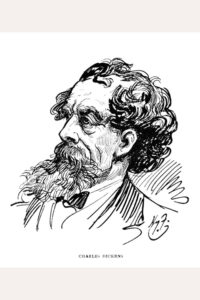
Great Expectations
Philip “Pip” Pirrip is a seven-year-old orphan who lives with his hot-tempered older sister and her kindly blacksmith husband, Joe Gargery, on the coastal marshes of Kent. On Christmas Eve, 1812, Pip visits the graves of his parents and siblings. There, he unexpectedly encounters an escaped convict who threatens to kill him if he does not bring back food and tools. Pip steals a file from among Joe’s tools, and a pie and brandy meant for Christmas dinner, which he delivers to the convict. That evening, Pip’s sister is about to look for the missing pie when soldiers arrive and ask Joe to mend some shackles. Joe and Pip accompany them into the marshes to recapture the convict, who is fighting with another escaped convict. The first convict confesses to stealing food and clearing Pip. A few years later, Miss Havisham, a wealthy and reclusive spinster who lives in a dilapidated Satis House wearing her old wedding dress after having been jilted at the altar, asks Mr Pumblechook, a relative of the Gargerys, to find a boy to visit her. Pip visits Miss Havisham and falls in love with Estella, her adopted daughter.
Estella is aloof and hostile to Pip, which Miss Havisham encourages. During one visit, another boy picks a fistfight with Pip, where Pip quickly gains the upper hand. Estella watches and allows Pip to kiss her afterwards. Pip visits Miss Havisham regularly until he is old enough to learn a trade. Joe accompanies Pip during the last visit to Miss Havisham, during which she gives Pip money to become an apprentice blacksmith. Joe’s surly assistant, Dolge Orlick, is envious of Pip and dislikes Mrs Joe. Orlick also complains when Joe says he needs to take Pip somewhere midday, thinking this is another sign of favouritism, of which Joe assures him he can quit work for the day. When Pip and Joe are away from the house, Joe’s wife is brutally attacked, leaving her unable to speak or do her work. When Pip sees a leg iron as the weapon used in the attack, he becomes worried, believing that it was the same leg iron he had helped liberate the convict from. Now bedridden, Mrs Joe cannot be “rampaging” towards Pip as before the attack. Pip’s former schoolmate Biddy joins the household to help with her care.
Read or download Book
Charles Dickens
Charles John Huffam Dickens (7 February 1812 – 9 June 1870) was an English novelist and social critic who created some of the world’s best-known fictional characters and is regarded by many as the greatest novelist of the Victorian era.
Biography
His works enjoyed unprecedented popularity during his lifetime, and by the 20th century, critics and scholars had recognized him as a literary genius. His novels and short stories are widely read today. Born in Portsmouth, Dickens left school at the age of 12 to work in a boot-blacking factory when his father, John, was incarcerated in a debtors’ prison. After three years, he returned to school before starting his literary career as a journalist. Dickens edited a weekly journal for 20 years, wrote 15 novels, five novellas, hundreds of short stories and non-fiction articles, lectured and performed readings extensively, was an indefatigable letter writer, and campaigned vigorously for children’s rights, for education, and other social reforms. Dickens’s literary success began with the 1836 serial publication of The Pickwick Papers, a publishing phenomenon—thanks mainly to the introduction of Sam Weller in the fourth episode—that sparked Pickwick merchandise and spin-offs. Within a few years, Dickens had become an international literary celebrity, famous for his humour, satire, and keen observation of character and society.
His novels, primarily published in monthly or weekly instalments, pioneered the serial publication of narrative fiction, which became the dominant Victorian mode for novel publication. Cliffhanger’s endings in his serial publications kept readers in suspense. The instalment format allowed Dickens to evaluate his audience’s reaction, and he often modified his plot and character development based on such feedback. For example, when his wife’s chiropodist expressed distress at how Miss Mowcher in David Copperfield seemed to reflect her disabilities, Dickens improved the character with positive features. His plots were carefully constructed, and he often weaved elements from topical events into his narratives. Masses of the illiterate poor would individually pay a half penny to have each new monthly episode read to them, opening up and inspiring a new class of readers. His 1843 novella A Christmas Carol remains popular and inspires adaptations in every creative medium. Oliver Twist and Great Expectations are also frequently adapted and evoke images of early Victorian London like many of his novels. His 1859 novel A Tale of Two Cities (set in London and Paris) is his best-known work of historical fiction. The most celebrity of his era, he undertook, in response to public demand, a series of public reading tours later in his career. The term Dickensian describes something reminiscent of Dickens and his writings, such as poor social or working conditions or comically repulsive characters.






